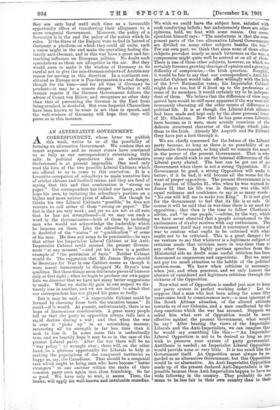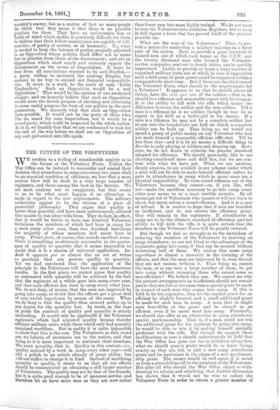AN ALTERNATIVE GOVERNMENT.
ACORRESPONDENT, whose letter we publish this week, writes to us of the possibility of forming an alternative Government. We confess that no recent arguments and no recent events have convinced us so fully as our correspondent's entertaining little sally in political speculation that an alternative Government is at present impossible One need only read the lists of the two possible Liberal Cabinets which are offered to us to come to this conviction. It is a favourite occupation of schoolboys to make tentative lists of cricket elevens and football teams, and they are fond of saying that this and that combination is "strong on paper." Our correspondent has tickled our fancy, and we hope his own, by imitating the schoolboy's pastime on a higher and more serious plane of affairs. But though he thinks his two Liberal Cabinets "possible," he does not venture to call either of them "strong on paper." The fact is they are very weak ; and yet we are not at all sure that he has not strengthened—if we may use such a word in the circumstances—both of them by including men who would not acknowledge the leadership which he imposes on them. Like the schoolboy, he himself is doubtful of the " status " or " qualification " of some of his men. He does not mean to be pessimistic—he says that either his Imperialist Liberal Cabinet or his Anti- Imperialist Cabinet could succeed the present Govern- ment "at any moment "—and yet his letter is a perfect 'example of "the pessimism of facts." Neither Cabinet would do. The suggestion that Mr. James Bryce should be Secretary for War in one Cabinet seems as though it were meant humorously to disregard Mr. Bryce's true qualities. But these things seem deli berate pieces of humour only at first sight ; when we begin to produce our own paper lists we discover that we have not many better suggestions to make. What we distill, tly gain in one respect we dis- tinctly lose in another, and we are inclined to admit that our correspondent has not played his game so badly.
But it may be said : "A respectable Cabinet could be formed by choosing from both the tentative teams." It could—if it would. At present, unfortunately, there is no hope of harmonious combination. A great many people tell us that the party in opposition always falls into a rapid decline during a war ; and that when the war is over it "picks up" in an astonishing manner, recovering all its strength in far less time than it took to lose it. In some sense this is undoubtedly true, and we heartily hope it may be so in the case of the present Liberal party. After the war there will be no "war policy" to wrangle over ; there will, on the other hand, be a glorious opportunity for Liberals to help in making the populations of the conquered territories as happy as, say, the Canadians. That should be a congenial task which ought to bring men who have become "better strangers" to one another within the ranks of their common party once again into close friendship. So far so good. We have only to wait, it seems. Time, the healer, will apply his well-known and invaluable remedies. We wish we could leave the subject here, satisfied with such comforting beliefs; but unfortunately there are other opinions, held, we. fear, with some reason. Our cone- spondent himself says : "The misfortune is that the com- ponent parts of the two alternative Liberal Governments are divided on many other subjects besides the war." For our own part, we think that since none of these other subjects provokes nearly so much bitterness as the war, a compromise might quite well be arrived at on all of them. There is one of these other subjects, however, on which we certainly foreseea growing cleavage of opinion and a growing difficulty of compromise,—the Irish question. Roughly, it would be fair to say that our correspondent's Anti-Im- perialist Cabinet would take office willingly with the help of the Irish Nationalist votes ; his Imperialist Cabinet might do so too, but if it lived up to the professions of some of its members, it would certainly try to be indepen- dent of them. We believe that the difference of view sug- gested here would be still more apparent if the war were not necessarily obscuring all the other causes of difference in political life. It is as though the Liberal-Irish alliance had been made and kept only by the sheer personal force of Mr. Gladstone. Now that he has gone some Liberals have become, as it were, more acutely conscious of the delicate structural character of the bridge which joins them to the Irish. Already Mr. Asquith and Sir Edward Grey have put a foot through it.
We are chiefly concerned for the future of the Liberal party because, so long as there is no possibility of an alternative Government, so long shall we remain too much in the power of the present Government. That is why every one should wish to see the internal differences of the Liberal party abated. The best can be got out• of no Government when there is not a strong Opposition. If a Government be good, a strong Opposition will make it better; if it be bad, it will become all the worse for the want of proper opposition. The present Government is in the position of Charles II., who, when he was warned by James IL that his life was in danger, was able, with equal rudeness and confidence, to say in so many words : "No one will kill me to make you King" It is not good for the Government to feel that its life is so safe. Of course it will be said that in war-time there is no need for opposition ; that then is the time to follow Chatham's advice, and "be one people,"—advice, by the way, which we have never observed that a people accustomed to the excitements of rivalry receives with any enthusiasm. The Government itself may even find it convenient in time of war to confuse what ought to be criticised with what ought not to be criticised. This is a great danger ; for we venture to say that whatever is a legitimate subject of criticism needs that criticism more in war-time than at any other time. In highly partisan speeches from the Ministerial side no doubt some useful criticism has been denounced as ungenerous and unpatriotic. But we must not pay too much attention to the babble of the political auction-room. We know when criticism is -necessary, when just, and when generous, and we only lament the absence of considered and legitimate criticism through the sickness of the Opposition.
Now what sort of Opposition is needed just now to keep our party system in perfect working order ? Let us suppose that a man who had been asleep for some fifty years came back to consciousness now,—a man ignorant of the South African situation, of the altered attitude towards us of our Colonies, and a man unaffected by the deep emotions which the war has aroused. Suppose we asked him what sort of Opposition would be most effective against the present Government, what would he say? After hearing the views of the Imperialist Liberals and the Anti-Imperialists, we can imagine that he would say something like this :—" An Imperialist Liberal Opposition is not to be desired so long as you wish to preserve your system of party government. Antithesis is needed; an Imperialist Liberal Opposition would provide none or very little. It is too much like the Government itself. An Opposition must always be re- garded as an alternative Government, but this Opposition would. be no alternative. An Anti-Imperialist Opposition made up of the present declared Anti-Imperialists is im- possible because these Anti-Imperialists happen to have no wide following in the country. They probably do not mean to be less fair to their own country than to their country's enemy, but as a matter of fact so many people do think that they mean it that there is no possible position for them. They have an unfortunate bias or labit of mind which makes it genuinely difficult for them to believe that their fellow-countrymen are capable of self- sacrifice, of purity of motive, or of humanity. No, what is needed to keep the balance of parties properly adjusted is an Opposition whose politics shall differ not in name but in practice from those of the Government; and yet an Opposition which shall sanely and seriously oppose the Government on the issues of Imperialism. It must be free from all associations reputed to be anti-English,— .a party willing to maintain the existing Empire, but anxious in no way to extend our Imperial responsibili- ties. It must, in a word, be the party of sane 'Little Englandism.' Such an Opposition would be a real Opposition." That would be the opinion of our awakened • sleeper; and we honestly believe that such an Opposition would serve the double purpose of checking and criticising to some useful purpose the bent of our politics in the next generation. We sincerely wish that such an Opposition were possible. It would not be the party of those who, like us, stand for sane Imperialism, but it would be a sound party, which could be respected by the whole nation. As it is, we frankly fear that we are condemned to wait for the end of the war before we shall see an Opposition of any sort galvanised into life again.















































 Previous page
Previous page